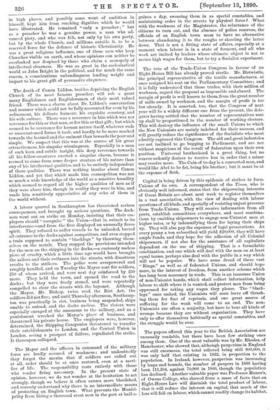A labour quarrel in Southampton has threatened serious consequences, and
brought up serious questions. The dock- men went out on strike on Monday, insisting that their em- ployers should " recognise " the Union—that is, submit to its interference—and from the first displayed an unusually fierce spirit. They refused to suffer vessels to be unloaded, barred all entrance to the docks against competitors, and even stopped a train supposed to contain " blacklegs " by throwing them- selves on the metals. They stopped the provisions intended for the men on the shipping in the docks,—a curiously useless piece of cruelty, which a little time ago would have brought the sailors and their cutlasses into the streets, with disastrous results to the strikers. The police were overpowered and roughly handled, and on Tuesday the Mayor sent for soldiers, 250 of whom arrived, and were next day reinforced by 250 more. They held the town, and opened the road to the docks ; but they were freely stoned, and were repeatedly compelled to clear the streets with the bayonet. Although the Mayor, Mr. Bishop, twice read the Riot Act, the soldiers did not fire; and until Thursday afternoon, Southamp- ton was practically in riot, business being suspended, ships unable to unload, and the docks useless. The rioters were especially enraged at the summons to the military, and as a punishment wrecked the Mayor's place of business, and threatened his private house. The employers were, however, determined, the Shipping Companies threatened to transfer their establishments to London, and the Central Union in London, seeing a prospect of failure, repudiated the strike. It thereupon collapsed.






































 Previous page
Previous page